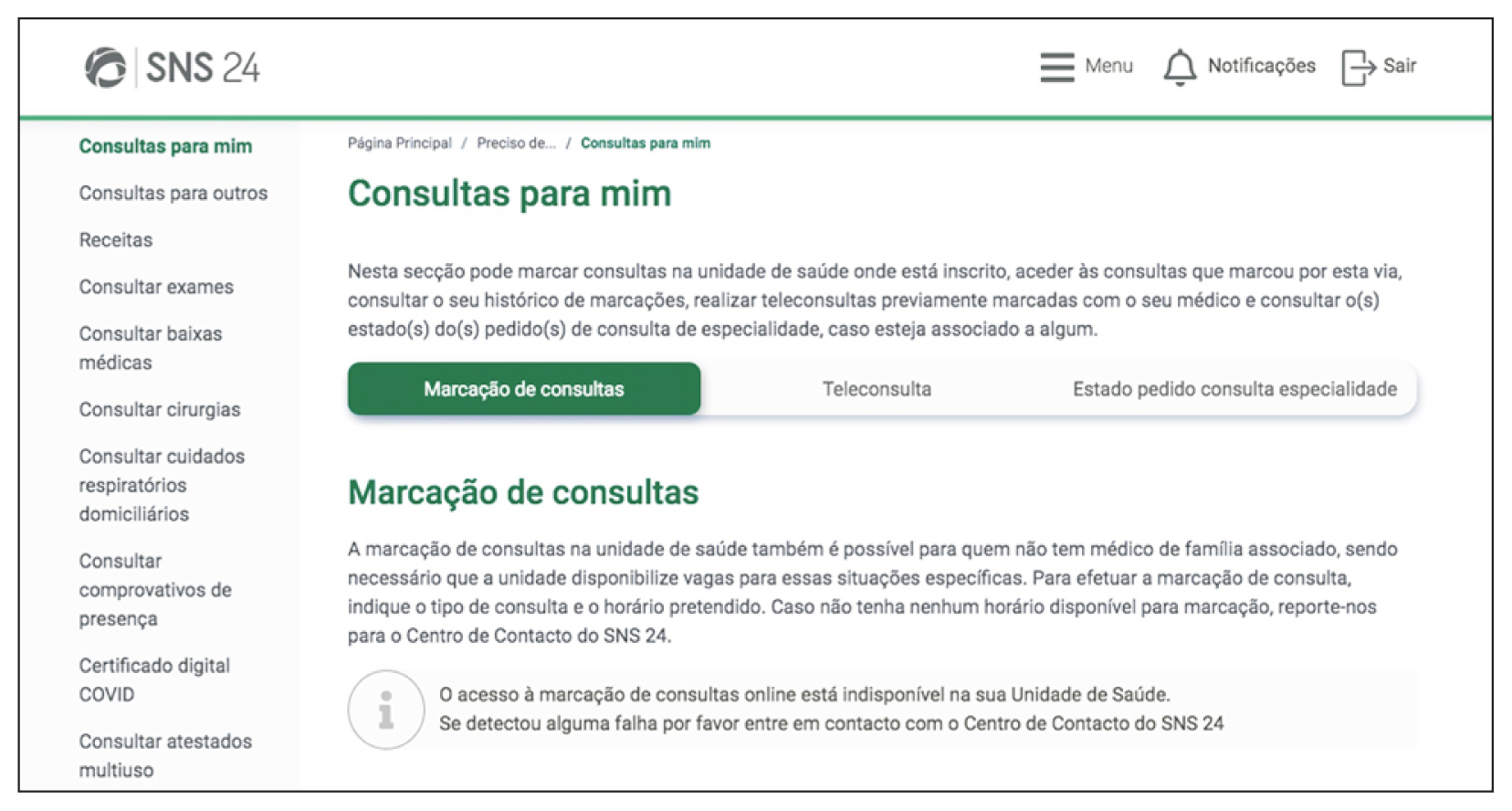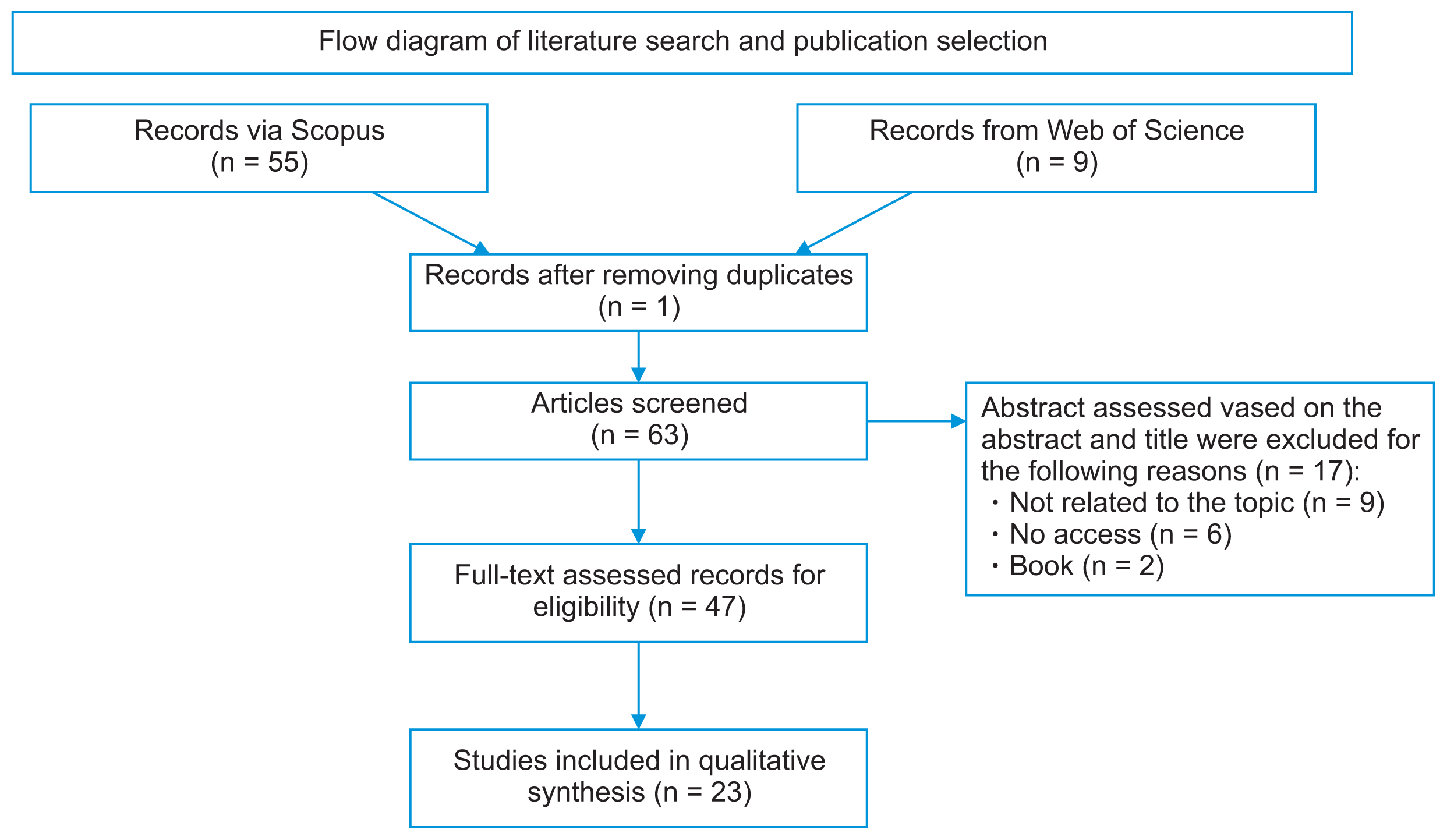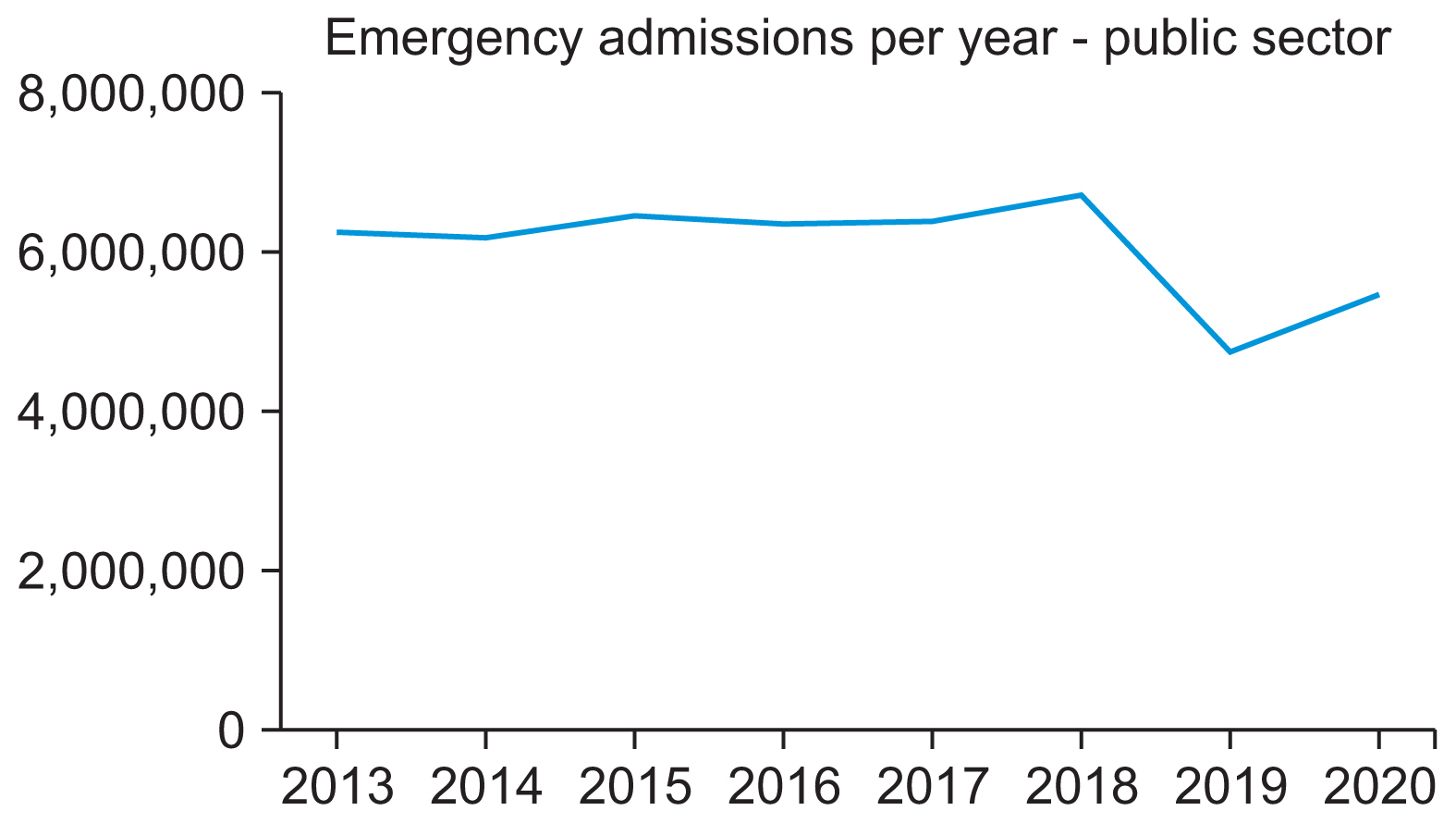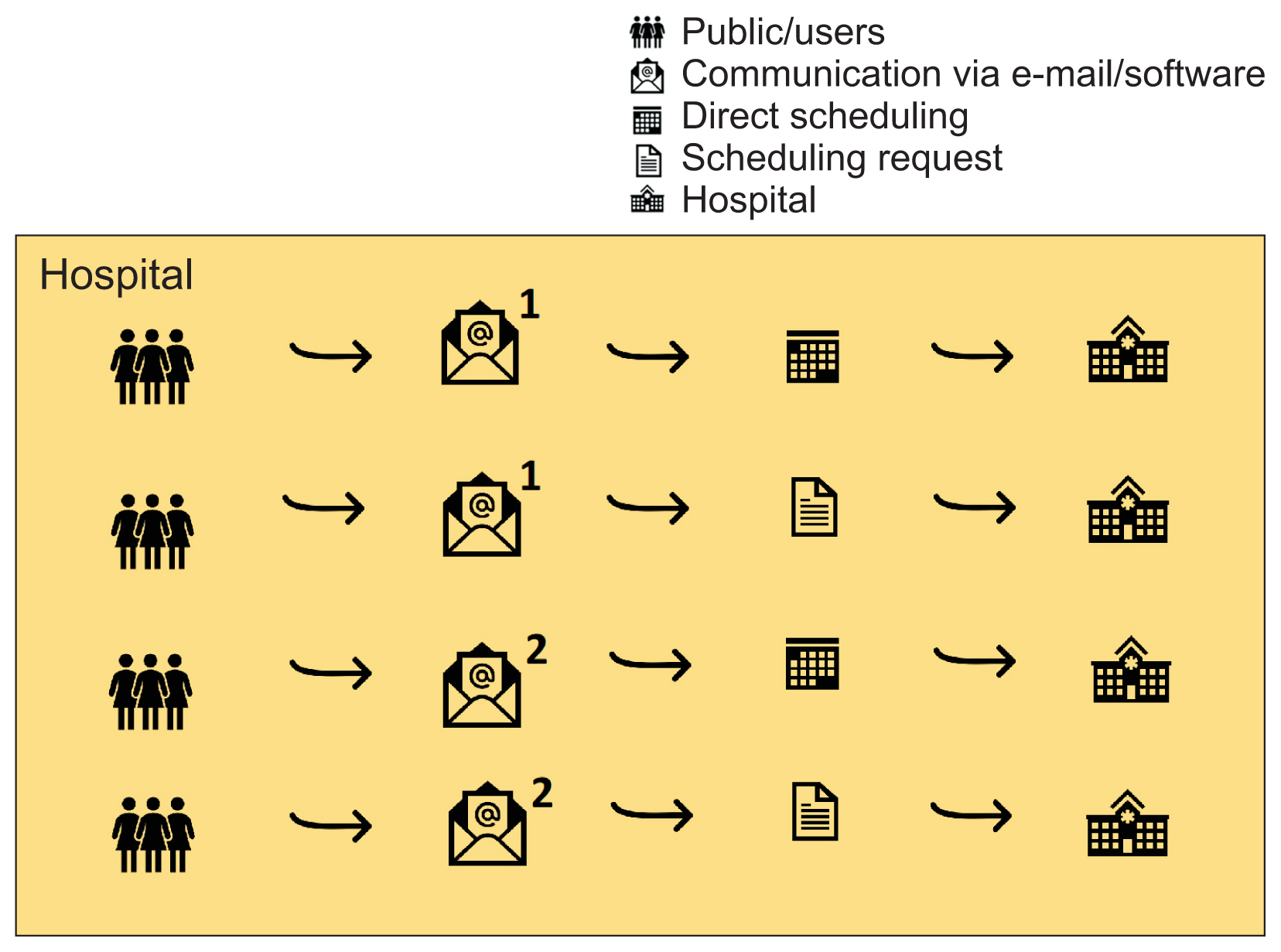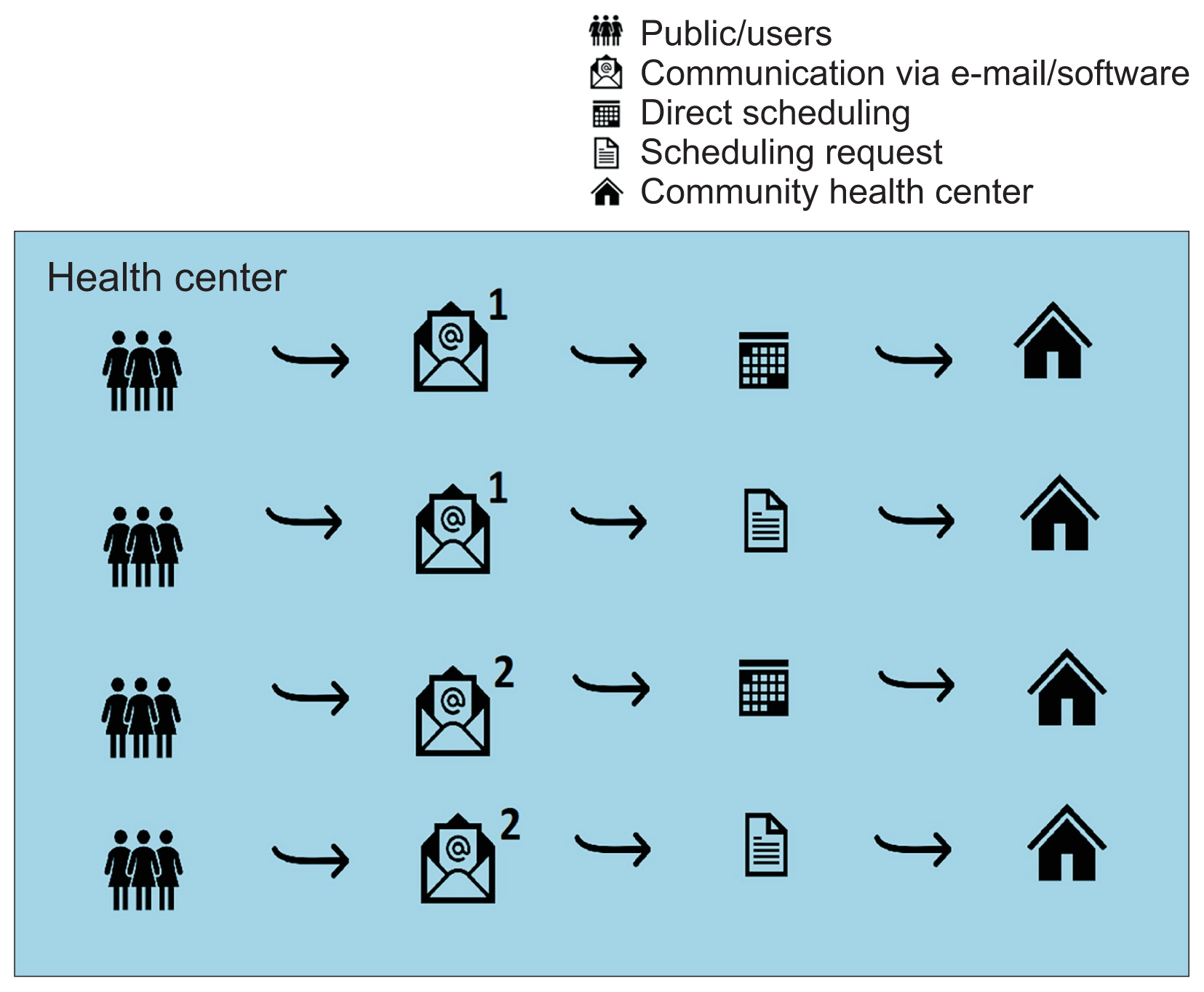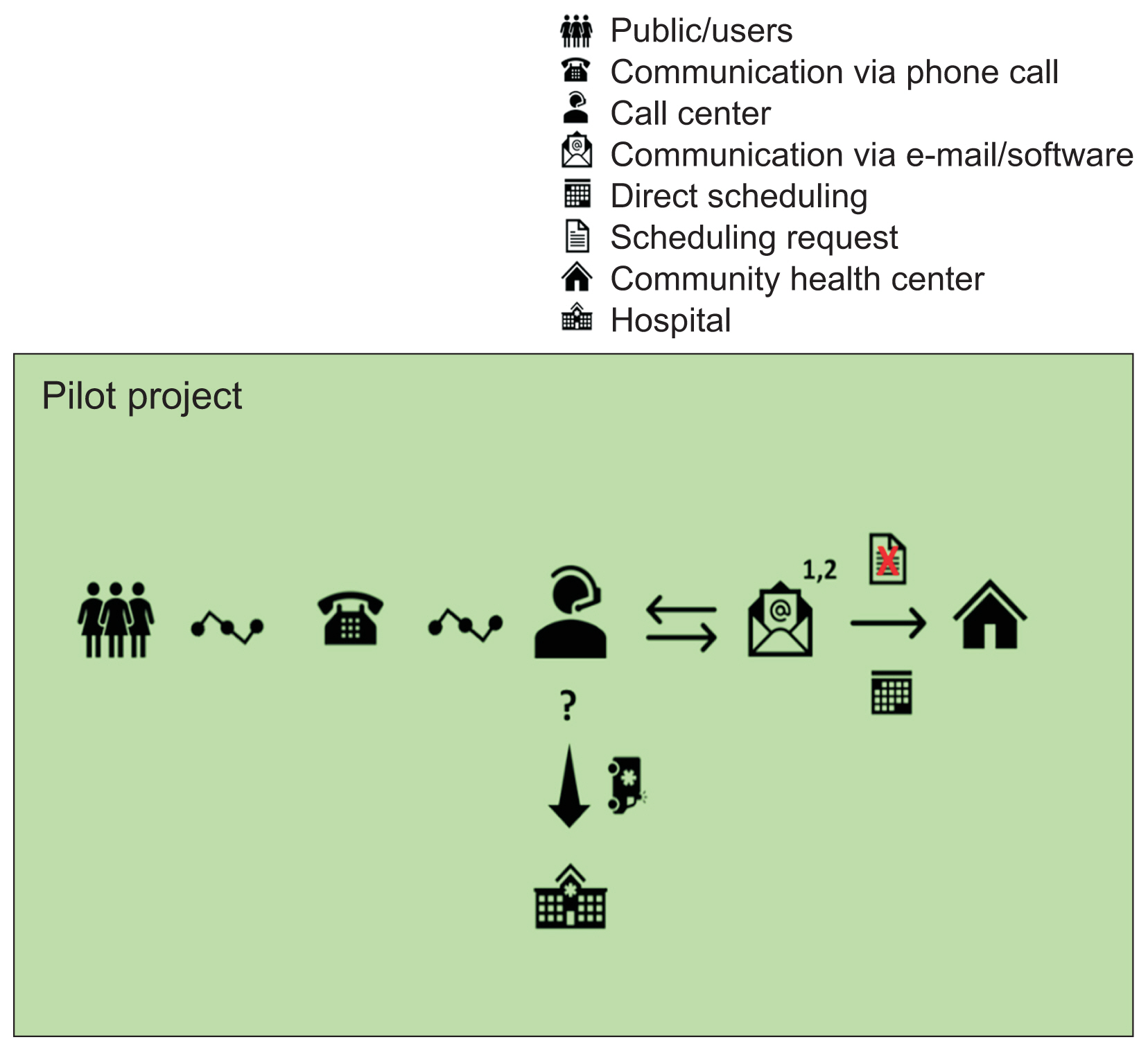Healthc Inform Res.
2024 Jul;30(3):194-205. 10.4258/hir.2024.30.3.194.
Technology and Access to Healthcare with Different Scheduling Systems: A Scoping Review
- Affiliations
-
- 1Center for Research and Studies in Sociology at the University Institute of Lisbon (CIES-Iscte), Lisbon, Portugal
- 2PSYLAB, Instituto de Saúde Ambiental (ISAMB), the Lisbon School of Medicine, University of Lisbon (FMUL), Lisbon, Portugal
- KMID: 2558316
- DOI: http://doi.org/10.4258/hir.2024.30.3.194
Abstract
Objectives
Online consultation scheduling is increasingly common in health services across various countries. This paper reviews articles published in the past five years and reflects on the risks and benefits of this practice, linking it to a recent Portuguese pilot project.
Methods
A search for articles from Web of Science and Scopus published since 2018 was conducted using the terms “online scheduling,” “online booking,” and “consultations.” This search was completed in the last week of 2023.
Results
Out of 64 articles retrieved, 26 were relevant to the topic. These articles were reviewed, and their main findings, along with those from other relevant sources, were discussed.
Conclusions
Several limitations of online consultations were identified, encompassing ethical, clinical, and economic aspects. While these consultations tend to be less expensive, their accessibility varies based on factors such as the users’ age, whether they reside in rural or urban areas, and the technological capabilities of different countries, indicating that access disparities may continue to widen. Confidentiality concerns also arise, varying by medical specialty, along with issues related to payment. Overall, however, both users and health professionals view the advent of online consultation booking positively. In conclusion, despite the risks identified, online consultation booking has the potential to enhance user access to health services, provided that usage limitations and technological disparities are addressed. Research production has not kept pace with rapid technological advancements.
Figure
Reference
-
References
1. Peters BG. Institutional theory in political science: the new institutionalism. 3rd ed. New York (NY): Continuum;2012.2. Oliveira FC. [Factors contributing to the influx of nonurgent cases in emergency services: a study at Hospital da Senhora da Oliveira, Guimarães, E.P.E.] [Thesis]. Braga, Portugal: Universidade do Minho;2020.3. Instituto Nacional de Estatistica. Attendances at emergency services (No.) in public hospitals of universal access and hospitals in public-private partnership by geographic localization (NUTS - 2013); Annual (2) [Internet]. Lisbon, Portugal: Instituto Nacional de Estatistica;2023. [cited at 2023 May 28]. Available from: https://www.ine.pt/xportal/xmain?xpid=INE&xpgid=ine_indicadores&indOcorrCod=0008119&contexto=bd&selTab=tab2.4. Servicos Partilhados do Ministerio da Saude. “Call First, Save Lives”, a pilot project by the SNS with support from SPMS, has started in Póvoa de Varzim and Vila do Conde [Internet]. Lisbon, Portugal: Servicos Partilhados do Ministerio da Saude;2023. [cited at 2023 May 29]. Available from: https://www.spms.min-saude.pt/2023/05/ligue-antes-salve-vidas-projeto-pilotodo-sns-com-apoio-da-spms-arrancou-na-povoa-de-varzim-e-vila-do-conde/.5. Servicos Partilhados do Ministerio da Saude. Portal SNS 24[Internet]. Lisbon, Portugal: Servicos Partilhados do Ministerio da Saude;2023. [cited at 2023 Jun 17]. Available from: https://www.spms.min-saude.pt/sns-24/.6. Page MJ, McKenzie JE, Bossuyt PM, Boutron I, Hoffmann TC, Mulrow CD, et al. The PRISMA 2020 statement: an updated guideline for reporting systematic reviews. BMJ. 2021; 372:n71. https://doi.org/10.1136/bmj.n71.
Article7. Kucuk A, Demirci M, Kerman G, Ozsoy VS. Evaluating of hospital appointment systems in Turkey: challenges and opportunities. Health Policy Technol. 2021; 10(1):69–74. https://doi.org/10.1016/j.hlpt.2020.11.008.
Article8. Woodcock EW. Barriers to and facilitators of automated patient self-scheduling for health care organizations: scoping review. J Med Internet Res. 2022; 24(1):e28323. https://doi.org/10.2196/28323.
Article9. Qabajeh MM, Mousa S, Saleh HA, Hasan JA. Design and implementation of mobile-based application for appointments systems for vaccinations in medical centers. In : Proceedings of 2021 31st International Conference on Computer Theory and Applications (ICCTA); 2021 Dec 11–13; Alexandria, Egypt. p. 54–8. https://doi.org/10.1109/ICCTA54562.2021.9916616.
Article10. Motulsky A, Bosson-Rieutort D, Usher S, David G, Moreault MP, Gagnon MP, et al. Evaluation of a national e-booking system for medical consultation in primary care in a universal health system. Health Policy. 2023; 131:104759. https://doi.org/10.1016/j.healthpol.2023.104759.
Article11. Garaix T, Rostami S, Xie X. Daily outpatient chemotherapy appointment scheduling with random deferrals. Flex Serv Manuf J. 2020; 32:129–53. https://doi.org/10.1007/s10696-018-9326-x.
Article12. Woodcock E, Sen A, Weiner J. Automated patient self-scheduling: case study. J Am Med Inform Assoc. 2022; 29(9):1637–41. https://doi.org/10.1093/jamia/ocac087.
Article13. Kunonga TP, Spiers GF, Beyer FR, Hanratty B, Boulton E, Hall A, et al. Effects of digital technologies on older people’s access to health and social care: umbrella review. J Med Internet Res. 2021; 23(11):e25887. https://doi.org/10.2196/25887.
Article14. Yang PC, Chu FY, Liu HY, Shih MJ, Chen TJ, Chou LF, et al. Features of online hospital appointment systems in Taiwan: a nationwide survey. Int J Environ Res Public Health. 2019; 16(2):171. https://doi.org/10.3390/ijerph16020171.15. Kevat A, Manohar J, Bate N, Harris K. Online referral and immediate appointment selection system empowers families and improves access to public community paediatric clinics. J Paediatr Child Health. 2019; 55(4):454–8. https://doi.org/10.1111/jpc.14228.
Article16. Soliman AM. Telemedicine in the cardiovascular world: ready for the future? Methodist Debakey Cardiovasc J. 2020; 16(4):283–90. https://doi.org/10.14797/mdcj-16-4-283.
Article17. Li Y, Wang H, Wang N, Zhang T. Optimal scheduling in cloud healthcare system using Q-learning algorithm. Complex Intell Systems. 2022; 8(6):4603–18. https://doi.org/10.1007/s40747-022-00776-9.
Article18. Noma AM, Musa KI, Mamman H, Mato AD, Yusuf AA, Sambo M. Design of intelligent and secure hospital appointment scheduling system. In : Proceedings of 202252 IEEE Nigeria 4th International Conference on Disruptive Technologies for Sustainable Development (NIGERCON); 2022 Apr 5–7; Lagos, Nigeria. p. 1–5. https://doi.org/10.1109/NIGERCON54645.2022.9803093.
Article19. Eslami S, Ganjali R. Medical informatics applications in COVID-19 crisis control: protocol for systematic literature review. Front Health Inform. 2021; 10:56.
Article20. Hannemann N, Gotz NA, Schmidt L, Hubner U, Babitsch B. Patient connectivity with healthcare professionals and health insurer using digital health technologies during the COVID-19 pandemic: a German cross-sectional study. BMC Med Inform Decis Mak. 2021; 21(1):250. https://doi.org/10.1186/s12911-021-01605-8.
Article21. Johnson C, Dupuis JB, Goguen P, Grenier G. Changes to telehealth practices in primary care in New Brunswick (Canada): a comparative study pre and during the COVID-19 pandemic. PLoS One. 2021; 16(11):e0258839. https://doi.org/10.1371/journal.pone.0258839.
Article22. Murphy M, Scott LJ, Salisbury C, Turner A, Scott A, Denholm R, et al. Implementation of remote consulting in UK primary care following the COVID-19 pandemic: a mixed-methods longitudinal study. Br J Gen Pract. 2021; 71(704):e166–77. https://doi.org/10.3399/bjgp.2020.0948.
Article23. Deepa N, Pandiaraja P. Hybrid context aware recommendation system for e-health care by Merkle hash tree from cloud using evolutionary algorithm. Soft Comput. 2020; 24(10):7149–61. https://doi.org/10.1007/s00500-019-04322-7.
Article24. Pisirgen A, Peker S. A UML-based conceptual model for appointment booking systems. In : Proceedings of 2021 6th International Conference on Computer Science and Engineering (UBMK); 2021 Sep 15–17; Ankara, Turkey. p. 812–7. https://doi.org/10.1109/UBMK52708.2021.9558929.
Article25. Fan G, Deng Z, Ye Q, Wang B. Machine learning-based prediction models for patients no-show in online outpatient appointments. Data Sci Manag. 2021; 2:45–52. https://doi.org/10.1016/j.dsm.2021.06.002.
Article26. Xu X, Hu M, Li X. Coping with no-show behaviour in appointment services: a multistage perspective. J Serv Theory Pract. 2022; 32(3):452–74. https://doi.org/10.1108/JSTP-08-2020-0196.
Article27. Denkovski V, Gavrilov G. E-appointments at primary care physicians during Covid-19 pandemic: viewpoint and satisfaction of medical consumers. EAI Endorsed Trans Pervasive Health Technol. 2022; 8(31):e2. http://dx.doi.org/10.4108/eetpht.v8i31.1129.
Article28. Hua Y, Che T, Yang C, Hu M. Customer no-show reduction in web-based appointment service: investigations of non-attendance behaviors. Serv Ind J. 2024; 44(7–8):538–62. https://doi.org/10.1080/02642069.2022.2045963.
Article29. Kitsios F, Stefanakakis S, Kamariotou M, Dermentzoglou L. Digital Service Platform and Innovation in Healthcare: Measuring Users’ Satisfaction and Implications. Electronics. 2023; 12(3):662. https://doi.org/10.3390/electronics12030662.
Article30. Mold F, de Lusignan S. Patients’ online access to their primary care electronic health records and linked online services: implications for research and practice. J Pers Med. 2015; 5(4):452–69. https://doi.org/10.3390/jpm5040452.
Article31. Zhao P, Yoo I, Lavoie J, Lavoie BJ, Simoes E. Web-based medical appointment systems: a systematic review. J Med Internet Res. 2017; 19(4):e134. https://doi.org/10.2196/jmir.6747.
Article32. Wang J, Fung RY. Adaptive dynamic programming algorithms for sequential appointment scheduling with patient preferences. Artif Intell Med. 2015; 63(1):33–40. https://doi.org/10.1016/j.artmed.2014.12.002.
Article33. Jeewandara N. e Sayana: A web based clinic appointment system for MOH clinics in Sri Lanka. In : Proceedings of 2015 8th International Conference on Ubi-Media Computing (UMEDIA); 2015 Aug 24–26; Colombo, Sri Lanka. p. 116–20. https://doi.org/10.1109/UMEDIA.2015.7297439.
Article34. Millhiser WP, Veral EA. A decision support system for real-time and dynamic scheduling of multiple patient classifications in ambulatory care services. In : Proceedings of 2016 Winter Simulation Conference (WSC); 2016 Dec 11–14; Washington, DC, USA. p. 2053–64. https://doi.org/10.1109/WSC.2016.7822249.
Article
- Full Text Links
- Actions
-
Cited
- CITED
-
- Close
- Share
- Similar articles
-
- The Scoping Review Approach to Synthesize Nursing Research Evidence
- Scoping Review of the Literature on Smart Healthcare for Older Adults
- Electronic Health Record: Definition, Categories and Standards
- Patient navigation in women’s health care for maternal health and noncancerous gynecologic conditions: a scoping review
- A Development of Decision Support System for Nurse Scheduling

